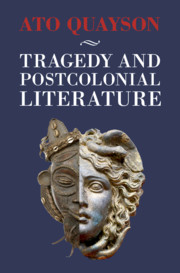Book contents
- Tragedy and Postcolonial Literature
- Tragedy and Postcolonial Literature
- Copyright page
- Dedication
- Contents
- Preface and Acknowledgments
- Chapter 1 Introduction
- Chapter 2 Ethical Cosmopolitanism and Shakespeare’s Othello
- Chapter 3 History and the Conscription to Colonial Modernity in Chinua Achebe’s Rural Novels
- Chapter 4 Ritual Dramaturgy and the Social Imaginary in Wole Soyinka’s Tragic Theatre
- Chapter 5 Archetypes, Self-Authorship, and Melancholia
- Chapter 6 Form, Freedom, and Ethical Choice in Toni Morrison’s Beloved
- Chapter 7 On Moral Residue and the Affliction of Second Thoughts
- Chapter 8 Enigmatic Variations, Language Games, and the Arrested Bildungsroman
- Chapter 9 Distressed Embodiment and the Burdens of Boredom
- Chapter 10 Conclusion
- Bibliography
- Index
Chapter 4 - Ritual Dramaturgy and the Social Imaginary in Wole Soyinka’s Tragic Theatre
Published online by Cambridge University Press: 05 February 2021
- Tragedy and Postcolonial Literature
- Tragedy and Postcolonial Literature
- Copyright page
- Dedication
- Contents
- Preface and Acknowledgments
- Chapter 1 Introduction
- Chapter 2 Ethical Cosmopolitanism and Shakespeare’s Othello
- Chapter 3 History and the Conscription to Colonial Modernity in Chinua Achebe’s Rural Novels
- Chapter 4 Ritual Dramaturgy and the Social Imaginary in Wole Soyinka’s Tragic Theatre
- Chapter 5 Archetypes, Self-Authorship, and Melancholia
- Chapter 6 Form, Freedom, and Ethical Choice in Toni Morrison’s Beloved
- Chapter 7 On Moral Residue and the Affliction of Second Thoughts
- Chapter 8 Enigmatic Variations, Language Games, and the Arrested Bildungsroman
- Chapter 9 Distressed Embodiment and the Burdens of Boredom
- Chapter 10 Conclusion
- Bibliography
- Index
Summary
I argue in Chapter 4 that Wole Soyinka’s essentially dramatic gifts are geared more towards anti-mimeticism than towards any form of naturalistic representation and that when staging character and setting in his anti-mimetic plays, he elects a dramatic medium that allows their largely aesthetic-political messages to be communicated through cryptic and often elusive ritual meanings. Thus, in The Road, Professor illustrates a sense of edginess through the amplifying delirium that he experiences in attempting to merge Yorùbá and Christian epistemologies in pursuit of the Word. While Death and the King’s Horseman presents a minute interpretation of the moving parts involved in an error of judgment, reversal of fortune, and anagnorisis that would have been much appreciated by Aristotle. The latter play also illustrates several elements reminiscent of the Greeks, such as a strong degree of disputatiousness, a carefully choreographed chorus-function, and an idea of the pharmakos that aligns sacrifice directly with the welfare of the polis.
Keywords
- Type
- Chapter
- Information
- Tragedy and Postcolonial Literature , pp. 124 - 155Publisher: Cambridge University PressPrint publication year: 2021

